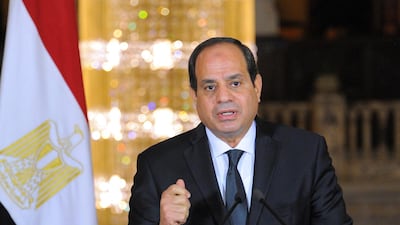Egypt’s failure to use the UN Security Council to force a breakthrough in its dispute with Ethiopia over a Nile dam Addis Ababa is building has left it grappling with a delicate damage-control task.
Cairo had hoped last Thursday’s Security Council meeting on the Grand Ethiopian Renaissance Dam would bring renewed energy to protracted negotiations between Ethiopia and downstream nations Egypt and Sudan.
Instead, the second filling of the hydroelectric dam looks set to go ahead despite vehement opposition from Cairo and Khartoum.
This leaves Egypt struggling to contain the fallout from its diplomatic setback and running out of options to protect its share of the Nile’s waters.
Senior government officials are at pains to highlight the “benefits” of going to the council while they deliberate the way ahead.
Curiously, no one has mentioned the prospect of resuming the negotiations that acrimoniously broke down in April.
That was not unexpected given the concern of many Egyptians over the impact of the dam on their lives and the sensitive questions likely to be raised about the government’s handling of the crisis.
“The comments made by council members reflected the concern over the issue and the necessity to reach an agreement through the African Union, and that in itself is an achievement,” Egyptian Foreign Minister Sameh Shoukry said at the weekend.
“The meeting offered Egypt an opportunity to place within an official framework the history and chronology of 10 years of negotiations”, he said, offering an upbeat account of the meeting.
Egypt went to the council firmly convinced that right was on its side in the decade-long dispute over the dam, which is being built on the Blue Nile, the river’s main tributary.
But at the end, there was neither support nor much sympathy for Egypt’s case.

The outcome stunned Egypt as council members, including those counted by Cairo as allies and friends, were reluctant to take its side or denounce Ethiopia’s unilateral actions.
Instead, public comments by council members ignored Egypt’s argument that its very existence was on the line.
Responding to comments made by council members that issues of water and transnational rivers are best settled outside the 15-nation body, Mohamed Anis Salem of the Egyptian Council for Foreign Affairs said national security issues have been redefined over the past 20 years to include health, refugees, water and food.
“The council is failing in its role to engage in new security issues,” said Mr Salem, who is also a former Egyptian ambassador.
“Going to the Security Council was the natural step given the impasse in the negotiations process, but members are listening to their own interests and they don’t want to create dangerous precedents.”
The council has taken no action following the meeting, incensing Mr Shoukry who publicly claimed that Security Council members neglected their duty and prioritised their own national interests over the need to maintain security and stability in a combustible region.
On Sunday, the foreign ministers of Egypt and Sudan left New York for Brussels and Moscow respectively, signalling the possible end of any prospect for action by the council on the dam.
Officials, experts and pro-government TV talk show hosts have sought to deflect from the disappointment felt by Egyptians who had pinned so much hope on the council.
They praised the meeting, the second by the council on the dam in consecutive years, as a diplomatic victory.
Others said Egypt succeeded in showing the world that Ethiopia’s “intransigence” was threatening the security and stability of the East Africa and Horn of Africa regions.
The talk show hosts heaped lavish praise on Mr Shoukry’s address to the council, saying it was authoritative and compelling.
One host, the popular Amr Adeeb of the Saudi-owned MBC Masr, went so far as to invite an expert who interpreted as both comfortable and confident Mr Shoukry’s body language while delivering his comments to the council.
In reality, however, the outcome of the meeting has come as a painful reality check for a country that has heavily invested in one diplomatic offensive after another across much of the world to argue its case on the dam and portray Ethiopia as the villain.
“The bitter and painful truth is that we did not achieve what we had hoped for in the Security Council meeting last Thursday,” Imad Hussein, editor of the Cairo daily Al Shorouk, wrote in its Sunday edition.
“What happened in the Security Council should be a wake-up call that we hold ourselves accountable and ask how did we come to this diplomatic end when Ethiopia, which is internally vulnerable and is experiencing a quasi-civil war, succeed in convincing the world of its viewpoint?”









